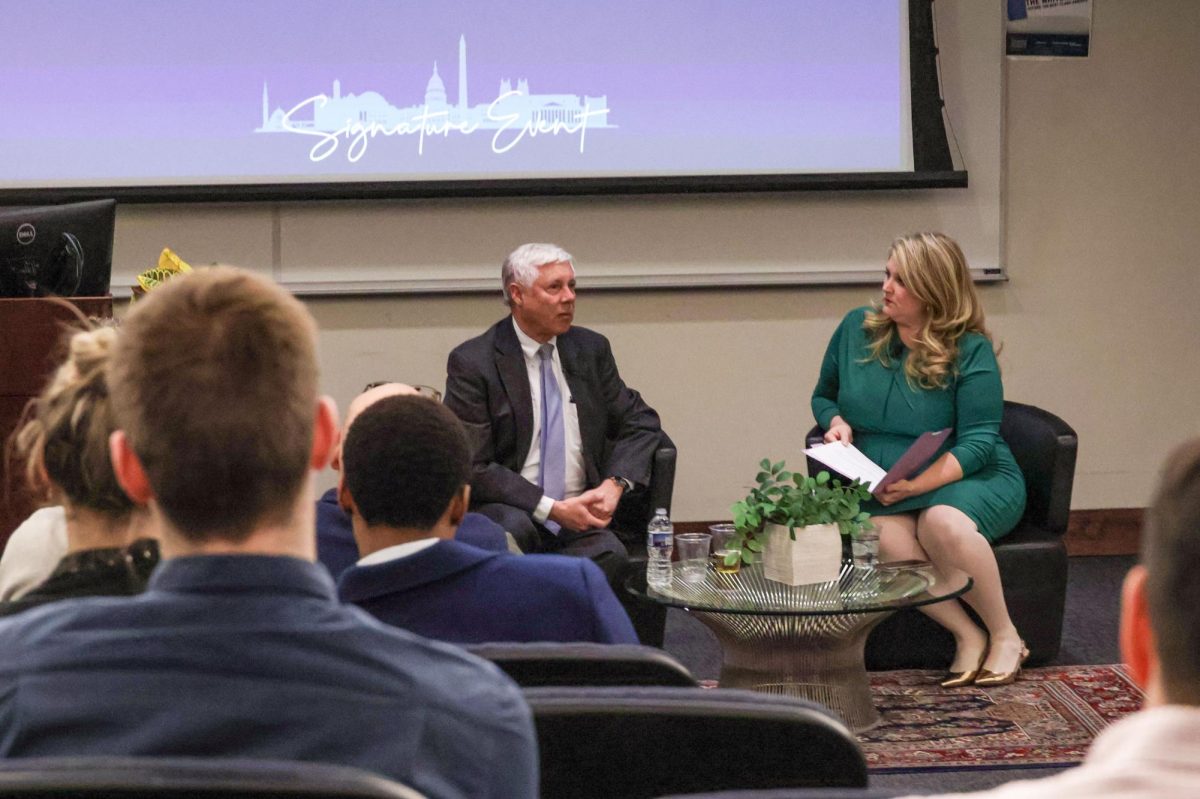Former Rep. Fred Upton (R-MI) gave insights into the value of bipartisan politics, the increasingly polarized modern political climate and his reasoning for voting to impeach two presidents in the Jack Morton Auditorium on Thursday.
Upton, who voted to impeach both former President Bill Clinton and President Donald Trump, talked about serving constituents from both political parties as the keynote speaker for the Graduate School of Political Management’s 2025 Paul O’Dwyer Endowed Forum for Political Ethics. Upton said in his experience representing Michigan, a swing state, he realized the necessity of working with both political parties to serve the broader population.
GSPM Program Director Angela McMillen Ayres introduced Upton and said recognizing bipartisanship is important in an era where society has forgotten its importance.
“We’re talking about today’s political landscape. Bipartisanship is not considered something that’s very important anymore, and it’s important for us to underscore the importance of working across both sides of the aisle,” Ayres said. “And these principles are part of a vibrant democracy and something I’m hoping that we can bring back someday.”
GSPM Public Relations and Communications Director Lesley Lopez led the forum with questions for the former representative and said Upton worked across the aisle to solve problems that were “plaguing us” and that his experience makes him “uniquely qualified” to speak about political ethics.
When asked about his decision to vote to impeach Trump in 2021, Upton said during the Jan. 6, 2021 insurrection he was sheltering with Rep. Dan Kildee (D-MI) in his office in the Rayburn Building, right across from the Capitol Building. He said after the chaos subsided, Upton went to the balcony and watched as people left the Capitol grounds.
He said he could see police officers set up “bomb ramps” and smelled the lingering tear gas. After the attack, he said he went over to the Capitol with former Rep. Tom Reed (R-NY) from the Problem Solvers Caucus and spoke with the exhausted SWAT team members who were lying in exhaustion on the Capitol floor amidst broken glass.
Prior to the insurrection, Trump made a speech to his supporters before they marched to the Capitol and said if they don’t “fight like hell” they won’t “have a country anymore.” Many point to this passage as an example of him inciting the riot that would eventually become an insurrection on the Capitol.
Upton said he chose to vote to impeach Trump because the day after the Jan. 6 insurrection, Trump said he had done “everything totally appropriate.” He said the insurrection wasn’t right and “there should be some different leadership.”
“It was really a conscious blow. And we, all the 10 of us, are pretty close, the 10 Republicans, and we all came to the same conclusion independently,” Upton said. “There was no doing this together. I mean, it was just like this was a terrible moment in America’s history.”
Upton said he voted for the 1992 North American Free Trade Agreement, and a senior Democratic office holder told him that if he voted against NAFTA, he would have a “free ride” to reelection and would not have a Democrat opponent in the next election. Upton said after speaking with union workers he understood the influx of jobs NAFTA created in Michigan, and he voted for NAFTA to support his constituents.
Upton said he liked representing a swing district because he knew he had to represent and work with people from all political parties.
“I’ve been in office 20 some years before I got there, I still had primaries from the right, and I got hit from the left as well,” Upton said. “My district went for Obama as well as Bill Clinton twice. So if people just voted straight ticket, I was gone.”
He said a part of representing a swing district was that he had to find people willing to work alongside both parties to get things done.
“I liked it because I was not a rubber stamp. I didn’t give my voting card to anybody. You had to convince me that you were right to get my vote,” Upton said. “My vote was hard to get.”
Upton spoke about the necessity in asking “tough questions” to get things done, especially when people’s lives are on the stake. He said “you run fast” to fight within your own party.
“At the end of the day, we’re going to figure this out, and we all know, too, that the only way it’s going to work is if we work together,” Upton said. “At some point, the right folks will come to that conclusion to get it done. So we may have a little bit of a rough ride now, but the rest of the world is watching as well.”





